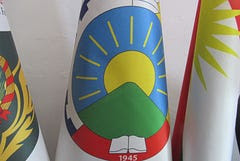
|
   |
|||
|
||||

Travel-Log: Day 2.
By Paul Martin at the Azadi (‘Freedom’) Base, Kurdistan, northern Iraq.

Travel-Log: Day One.
By Paul Martin near Erbil, Iraqi Kurdistan.

Why we need to secure objectivity on reporting in zones of conflict and in securing peace.
We are delighted to announce that a not-for-profit organisation has just been set up. More details to follow.
Athlete who survived Munich Olympics terror attack hopes for peace in Middle East
Shaul Ladany survived the Bergen-Belsen concentration camp where 50,000 died and then in 1972 he survived the Palestinian terror attack…

A young Egyptian film photographer got close to President Anwar Sadat, and was a witness of, an…
[QUESTION TO CONSIDER: Does unique personal testimony help us to understand the nature of the conflict ?]
Fired by NBC, hired by Piers Morgan: Peter Arnett on covering fall of Baghdad more than 20 years on.
As a journalist, I had covered the Vietnam War for years and watched as the United States and its few allies stumbled into a foreign…

How Ukraine’s Post Office chief is ‘stamping down’ on the Russian invaders.
[QUESTION TO CONSIDER: Does a personal story like this add to understanding of the war, or is it too much of a ‘left-field’ diversion from…
With prospects of victory looking slim, Ukrainians are waiting — in hope rather than in confidence.
[QUESTIONS TO CONSIDER: Does this piece convey a fair and accurate picture of a whole war? is it legitimate to see the whole war only from…

Why his ex-KGB boss hates Putin.
[QUESTION TO CONSIDER: Should the writer have included criticism of Kalugin and also, explained how he checked Kalugin’s actual track…
Close encounter in Lebanon: How an international journalist’s capture cast light on new realities.
[QUESTIONS TO CONSIDER: Does this personalised story add, or detract from, to understanding of the Lebanon conflict? How has the writer…
Hezbollah suspected he might be a spy.
Arabs contemplate demographic assault
[POINTS TO CONSIDER: How would this article actually affect the current conflict situation? Is the article’s publisher remiss in not…
The face of ISIS evil. And why a former ISIS sex slave says Shamima Begum must pay for her crimes
The face of evil — a face smashed by the war ISIS launched on civilization.
How and why a young British woman and a British-Pakistani doctor unwittingly became embroiled in…
[QUESTION TO CONSIDER: Is it helpful to understanding a conflict and its turns and twists if we focus on two individual stories of victims…
Mandela’s programme of peace and reconciliation has gone wrong, says Mandela’s daughter.
Nelson Mandela turning in his grave at the state of South Africa, says his daughter
Jul 17

Butchery in Bucha. An eye-opening trip there with an aid worker.
[QUESTIONS: How has this personal visit to a town a more effective tool to understand aspects of the Ukraine-Russian war than a wider, more…
Resistance leader inside Gaza says: Hamas leadership remnants must be expelled, as they have…
[QUESTION: How can we be sure this ‘resistance leader’ is genuine? Perhaps check if he has spoken before. The BBC has — just once, it…

How a former Iranian prisoner — hostage sees events as the war between Iran, Israel and the USa…
[EDUCATIONAL TOOL: Which version of this story works best, and fior which outputs?}This story, with photos, has other means of kicking off
Arafat died 20 years ago — what if he had lived?
[EDUCATIONAL TOOL: How does an article about two not-in-power politicians help us to understand a conflict and efforts to achieve an end…
What I saw in Jenin doesn’t match the media reports
Several scenes cast doubt on recent reporting of the IDF’s two-day incursion into West Bank city
Nelson Mandela: How the former South African leader was inspired by sport in freedom struggle
Sport played a crucial role in helping ‘Madiba’ form his vision of an egalitarian South Africa.

Ex-hostage and her “face of evil” ex-kidnapper.
[QUESTIONS TO CONSIDER: Is this a piece written for a tabloid or for a broadsheet newspaper? How can you tell? Is it one-sided in that it…

Going fast in Iraq: the £300 rocket-grenade launchers that can bring down a helicopter
[EDUCATIONAL TOOL: This is an example of a ‘hook’ in war reporting. Find a subject that has an attraction. People are intrigued by the idea…
Deeply painful yet deeply inspiring: four hostages we met who were released from Gaza captivity.
We met four ex-hostages named Emily, now 10 and another Emily now 28, and two other ex-hostages named Yarden and Luis. Their stories reveal a triumph of survival over adversity.
The focus is mainly on reporting from and about conflict zones and peace initiatives.
…Gaza lawyer Moumen al-Natour, 30, in his shrapnel-pockmarked Gaza City apartment, urging ways to end the conflict.
The Educational Centre for Objective Reporting on International Conflict and Peace, known as…
The focus is mainly on reporting on conflict zones and peace initiatives.
Zelensky’s right-hand man warns of new alliance of dictators led by Russia
[EDUCATIONAL TOOL: Has this interview given due ‘balance’, or does it not need to?]

Opinion: FW de Klerk was a pragmatist — not a man driven by ideology
[EDUCATIONAL TOOL: Referring back to a just-dead political leader can be a way to set out the current state of his country. Is this a…

Revealed: How the FBI tracked down second Lockerbie suspect nicknamed ‘The Ghost’
[EDUCATIONAL TOOL: How does this story reflect proper investigation? Was there a need to get FBI to comment first before publication. How…
Dec 20, 2020
Lockerbie bombing key witness had history of ‘making up stories’, says CIA handler
[QUESTION TO CONSIDER: This story contradicts the FBI story. Can both be worthy of publication, and why?]
NOTE RE COPYRIGHT:

